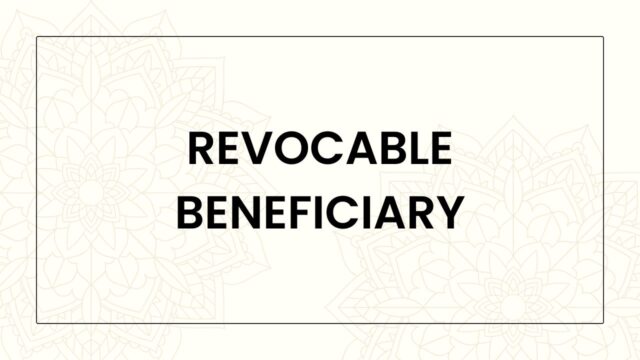
What is a revocable beneficiary
A revocable beneficiary is someone who has been named in a will or insurance policy to receive assets upon the death of the person who created the document. However, the creator of the document can change the beneficiary designation at any time, without the consent of the beneficiary. This type of designation is often used for people who are close to the creator of the document and are likely to experience a change in their relationship, such as a child or grandchild. It also allows the creator of the document to change their mind if they later determine that someone else would be a better recipient of the assets.
Why would you name a revocable beneficiary
There are several reasons why you might name a revocable beneficiary. For example, you may want to name a revocable beneficiary if you are not yet sure who you want to leave your assets to. Or, you may want to name a revocable beneficiary if the person you originally named as your beneficiary has died or can no longer serve in that role. Regardless of the reason, naming a revocable beneficiary gives you the flexibility to change your mind about who will receive your assets after your death.
How do you name a revocable beneficiary
When it comes to naming a revocable beneficiary, there are a few things you need to keep in mind. First of all, the person you name as your beneficiary should be someone you trust implicitly. This is because, as the name suggests, a revocable beneficiary can be changed at any time. Secondly, you need to make sure that the beneficiary is over the age of 18. This is because, in some states, minors are not legally allowed to inherit property. Finally, you should consider naming a secondary beneficiary in case the primary beneficiary is unable or unwilling to serve. By taking these factors into account, you can ensure that your revocable beneficiary is properly named and protected.
What are the benefits of naming a revocable beneficiary
Naming a revocable beneficiary offers several advantages. First, it allows you to specify who will receive your assets, rather than leaving this decision up to probate court. Second, naming a revocable beneficiary can help to avoid estate taxes and probate fees. Finally, it provides peace of mind knowing that your assets will go to the person or persons that you have chosen. While there are many benefits to naming a revocable beneficiary, it is important to keep in mind that this designation can be changed at any time prior to your death. As a result, it is important to review your beneficiaries on a regular basis to make sure that they are still the people that you want to receive your assets.
What happens if you don’t name a revocable beneficiary
The purpose of having a revocable beneficiary is to allow the original signers to change their minds about who should receive the benefits of the contract, should they so choose. Without naming a revocable beneficiary, the original signers retain all control over who receives the benefits of the contract. This can be advantageous if, for example, the original signers want to ensure that only their children receive the benefits.
However, it can also be disadvantageous if the original signers die without naming a new beneficiary, as the benefits will then go to whoever they named in their will. In short, while there are potential upsides to not naming a revocable beneficiary, there are also potential downsides. Ultimately, it is up to the original signers to decide whether or not to name one.
How can you revoke a beneficiary
When you add a beneficiary to your account, they are legally entitled to the money in the account if you die. You may decide at some point that you want to change the beneficiary or revoke their status altogether. To do this, you will need to contact your financial institution and request a change of beneficiary form. Once you have completed the form and returned it to the bank, the old beneficiary will no longer have any claim to the account. It is important to keep in mind, however, that beneficiary designation trumps wills in most cases, so even if you change your will, the old beneficiary will still be entitled to the account unless you take steps to change the designation.
What happens if you die without revoking a beneficiary
When you die, your assets will be distributed according to the terms of your will. However, if you have not revoked a previous beneficiary designation, your assets may be distributed according to the terms of that designation. This can happen even if you have since remarried or had children. As a result, it is important to regularly review your beneficiary designations and make sure that they reflect your current wishes. If you do not update your designations, you run the risk of your assets being distributed in a way that you did not intend. To avoid this, make sure to keep your beneficiary designations up to date.
Can you name more than one revocable beneficiary
A revocable beneficiary is someone who you name in your will to receive certain assets upon your death. Most people name one primary revocable beneficiary, such as a spouse or child, and then one or more secondary beneficiaries in case the primary beneficiary predeceases them. However, it is also possible to name multiple primary beneficiaries. For example, you might want to leave your house to your children equally. In this case, you would simply list all of their names as primary beneficiaries. It’s important to note that you can change your beneficiaries at any time, as long as you are of sound mind. So if your circumstances change, you can always update your will accordingly.


































